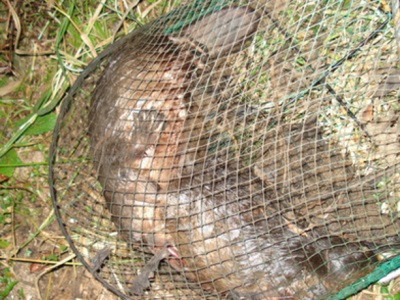14 February 2019

At the ninth meeting of Australia’s Environment Ministers on 8 November 2019, an Agreed Statement was issued that they intend to pursue a nationally consistent approach to address the “negative impacts that ‘opera house’ yabby nets have on Australia’s native wildlife, in particular on platypus”. Unfortunately, no time-frame or indication of the direction was given.
Currently, opera house-style yabby trap use is:
- banned in Tasmania and Victoria
- geographically restricted in Queensland and New South Wales
- permitted in South Australia.
At a meeting with Minister the Hon. Leeanne Enoch in December 2019, Wildlife Queensland commended the decision of the meeting. The Minister advised that a Cabinet position was taken to the meeting but could not be shared at this time. However, we were informed that the Hon. Mark Furner MP, Minister for Agricultural Industry Development and Fisheries, would be the Queensland representative on any discussions concerning a national approach.
Although previous correspondence with Minister Furner has not resulted in any positive action on banning opera house-style traps, a new approach is warranted.
It has been widely reported in New South Wales that the drought has significantly impacted platypus populations. Extensive areas of Queensland have also been subject to a crippling drought.
“Whilst recent observational data and eDNA surveys conducted by Wildlife Queensland’s PlatypusWatch program encouragingly provide evidence that platypuses still occur in the Dawson River in Central Queensland, the drought has impacted many waterways where platypus live,” says Wildlife Queensland spokesperson Des Boyland.
Wildlife Queensland’s campaign to ban opera house traps in Queensland
Since 2009, Wildlife Queensland has campaigned for a ban on opera-house-style traps and funnel traps in Queensland. In 2014, after years of advocating for change, the Government of the day saw fit to take action and amended regulations, significantly reducing the size of the entrance hole of traps being used east of the Great Dividing Range and east of the Gore Highway.
While this action was a small step in the right direction and aligned use in Queensland with that in New South Wales, platypus and other non-targeted air-breathing native fauna continue to be caught and drowned in these traps.
“Perhaps if there were strong and robust compliance and enforcement programs in place things may be different but that is not the case,” says Wildlife Queensland spokesperson Des Boyland.
“Opera house traps must go! Queensland must follow Tasmania and Victoria and ban the use of opera house traps in all public waters. After all, there are alternative nets on the market that will capture just as many yabbies without the risk of drowning platypus and other air-breathing wildlife,” says Boyland.
How you can help
Strong support for this ban is required if this inhumane and inappropriate situation is to change. We, and our wildlife, need your help.
- Write to Hon. Mark Furner MP, Minister for Agricultural Development and Fisheries, at P.O. Box 46, Brisbane QLD 4001 or email agriculture@ministerial.qld.gov.au expressing your support for a ban.
- You can also email Hon. Leeanne Enoch MP, Minister for Environment and the Great Barrier Reef, Minister for Science and Minister for the Arts, at environment@ministerial.qld.gov.au.
- Please report any sightings of enclosed yabby traps in local waterways in Queensland (since 2015).
Related articles and information
- 2019 Meeting of Environment Ministers
- Opera house traps have to go
- Happy Platypus flyer (pdf)
- Wildlife Queensland’s PlatypusWatch program
